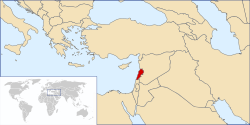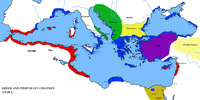
Greeks in Lebanon
Encyclopedia

Lebanon
Lebanon , officially the Republic of LebanonRepublic of Lebanon is the most common term used by Lebanese government agencies. The term Lebanese Republic, a literal translation of the official Arabic and French names that is not used in today's world. Arabic is the most common language spoken among...
is dated to ancient times and the Phoenicians and Greeks, both maritime peoples shared close ties. The Greek alphabet for example is derived from the Phoenician. The Greek presence is attested by several place names and the close ties between Greeks and the Lebanese Greek Orthodox and Greek Catholic
Melkite Greek Catholic Church
The Melkite Greek Catholic Church is an Eastern Catholic Church in full communion with the Holy See as part of the worldwide Catholic Church. The Melkites, Byzantine Rite Catholics of mixed Eastern Mediterranean and Greek origin, trace their history to the early Christians of Antioch, Syria, of...
communities.
History

Amioun
Amioun in and other scripts of the name, are most probably transliterated from the original Amyūn. It is the capital town of the predominantly Greek Orthodox area Koura District in the North of Lebanon.-Name:...
, (possibly from the Semitic word for Greeks: Yunan
Yunan
Yunan may refer to:in fictional characters* King Yunan, a character in One Thousand and One Nights, a collection of Middle Eastern and South Asian stories and folk talesin places...
) capital of the Koura District (from the Greek χωριά, villages) in the north of the country is a living testament of that. Following the 2006 invasion of Lebanon by Israel most Greeks have fled the country in order to avoid war operations. There remains a Greek community and Hellenic club in Beirut
Beirut
Beirut is the capital and largest city of Lebanon, with a population ranging from 1 million to more than 2 million . Located on a peninsula at the midpoint of Lebanon's Mediterranean coastline, it serves as the country's largest and main seaport, and also forms the Beirut Metropolitan...
.
Greek Muslims in Lebanon
There are about 7,000 Greeks living in TripoliTripoli
Tripoli is the capital and largest city in Libya. It is also known as Western Tripoli , to distinguish it from Tripoli, Lebanon. It is affectionately called The Mermaid of the Mediterranean , describing its turquoise waters and its whitewashed buildings. Tripoli is a Greek name that means "Three...
, Lebanon
Lebanon
Lebanon , officially the Republic of LebanonRepublic of Lebanon is the most common term used by Lebanese government agencies. The term Lebanese Republic, a literal translation of the official Arabic and French names that is not used in today's world. Arabic is the most common language spoken among...
. The majority of them are Muslims of Cretan origin. Records suggest that the community left Crete between 1866 and 1897, on the outbreak of the last Cretan uprising against the Ottoman empire, which ended the Greco-Turkish War of 1897
Greco-Turkish War (1897)
The Greco-Turkish War of 1897, also called the Thirty Days' War and known as the Black '97 in Greece, was a war fought between the Kingdom of Greece and Ottoman Empire. Its immediate cause was the question over the status of the Ottoman province of Crete, whose Greek majority long desired union...
. Many Greek Muslims of Lebanon somewhat managed to preserve their identity and language. Unlike neighbouring communities, they are monogamous
Monogamy
Monogamy /Gr. μονός+γάμος - one+marriage/ a form of marriage in which an individual has only one spouse at any one time. In current usage monogamy often refers to having one sexual partner irrespective of marriage or reproduction...
and consider divorce
Divorce
Divorce is the final termination of a marital union, canceling the legal duties and responsibilities of marriage and dissolving the bonds of matrimony between the parties...
a disgrace. Until the Lebanese Civil War
Lebanese Civil War
The Lebanese Civil War was a multifaceted civil war in Lebanon. The war lasted from 1975 to 1990 and resulted in an estimated 150,000 to 230,000 civilian fatalities. Another one million people were wounded, and today approximately 350,000 people remain displaced. There was also a mass exodus of...
, their community was close-knit and entirely endogamous
Endogamy
Endogamy is the practice of marrying within a specific ethnic group, class, or social group, rejecting others on such basis as being unsuitable for marriage or other close personal relationships. A Greek Orthodox Christian endogamist, for example, would require that a marriage be only with another...
. However many of them left Lebanon during the 15 years of the war. By 1988, many Greek Muslims from both Lebanon
Lebanon
Lebanon , officially the Republic of LebanonRepublic of Lebanon is the most common term used by Lebanese government agencies. The term Lebanese Republic, a literal translation of the official Arabic and French names that is not used in today's world. Arabic is the most common language spoken among...
and Syria
Syria
Syria , officially the Syrian Arab Republic , is a country in Western Asia, bordering Lebanon and the Mediterranean Sea to the West, Turkey to the north, Iraq to the east, Jordan to the south, and Israel to the southwest....
had reported being subject to discrimination by the Greek embassy because of their religious affiliation. The community members would be regarded with indifference and even hostility, and would be denied visas and opportunities to improve their Greek through trips to Greece.
See also
- Greeks in Saudi ArabiaGreeks in Saudi ArabiaThe Greek presence in Saudi Arabia predates the formation of both the Greek and Saudi states. It is mainly concentrated in the Hejaz region, bordering the Red Sea and centered around the city of Jeddah...
- Greeks in SyriaGreeks in SyriaThe Greek presence in Syria is dated to the 7th century BCE and became more prominent during the Hellenistic era and when the Seleucid Empire was centered there...
- Greece–Lebanon relationsGreece–Lebanon relationsGreece–Lebanon relations are the foreign relations between the two states of Greece and Lebanon. The relation between both people dates back to early antiquity, with the early trading activities between the ancient Greeks and the Phoenicians. In modern times, Greek-Lebanese bilateral relations are...

